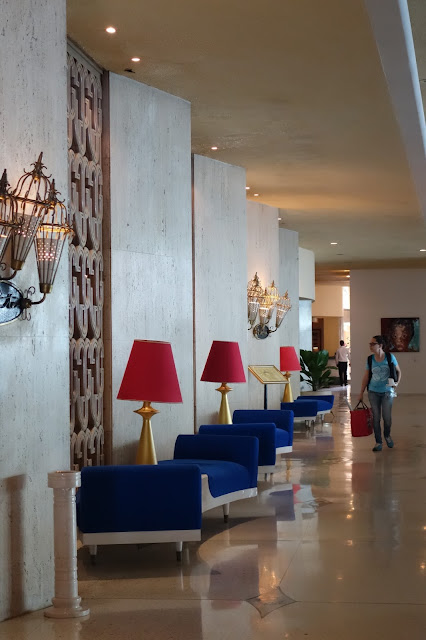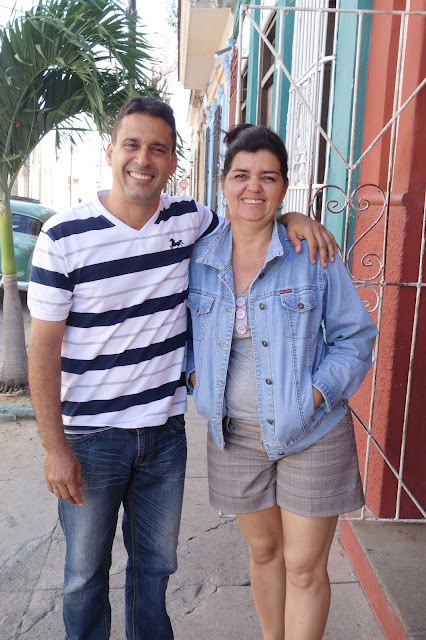and a last look at Havana
before moving on to the opposite coastline.
We spoke to so many young people in Havana
and, to a person, not one of them wanted to have children.
The economic situation in their country is so bad,
their prospects so bleak,
that none of them wanted to bring a child into the world in which they now live.
Abortion on demand is the most common form of birth control
and the birth rate is very low.
The population is skewed toward the elderly
because of the 'brain drain' of the young people
escaping from the country.
They spend hours every week,
standing in line outside the Spanish embassy,
trying to get a Spanish passport so they can leave the country.
Our tour guides husband (our guide, Yani, is the twin on the left)
had been in jail 3 times for attempting to escape Cuba.
Finally, as an incentive to stay,
he was offered the chance to be trained as a doctor;
he has completed his residency
and is now practicing medicine as a general practitioner.
and is now practicing medicine as a general practitioner.
Yani's mother is an OB/GYN.
Their salaries are $175.00 a month,
the top salary for anyone in Cuba.
Her husband can make more, in tips, as a doorman at the hotel working weekends
than he can as a physician.
As a physician, he also is the one who bears the responsibility
for the compliance of his patients
and suffers state consequences for their poor outcomes.
and suffers state consequences for their poor outcomes.
Physicians are, therefore, required to go to patients homes to check on them,
'train them',
give them medication etc
in order to ensure adherence with treatment.
Not sure how much of a reward or incentive from jail that trade off was!
Yani's father was jailed for 18 months
for selling a box of shoes from their living room
without a license.
His 'reward' was being made head of the local
Committee for the Defense of the Revolution;
a network of people designated to 'keep an eye on their neighbors'
and turn in to the state anyone who is breaking the law,
fomenting dissent
or plotting against the state.
Yani's father was jailed for 18 months
for selling a box of shoes from their living room
without a license.
His 'reward' was being made head of the local
Committee for the Defense of the Revolution;
a network of people designated to 'keep an eye on their neighbors'
and turn in to the state anyone who is breaking the law,
fomenting dissent
or plotting against the state.
Despite decades of severe deprivation,
civil despair
and mass exodus,
Cubans do not see their country as being 'third world';
they see themselves as a developing country
whose development just happened to be arrested
in the 1950's.
in the 1950's.
True, I was a small child in the 50's,
but it is NOT a decade I'd want to be stuck in!
Several places we saw were like visiting museums of that era;
it gave me shivers.
I expected to turn a corner and be in my parents 'rumpus room'
with Danish modern furniture!
After 5 days of exploring Havana though,
it was time to leave and head southeast
toward Cienfuegos and Trinidad.
Along the way, we stopped briefly at resort towns
and, as soon as travel restrictions are lifted
and US citizens can move freely around the country,
there's a lounge chair with my name written on it
at one of them!
We were unable to visit at the Bay of Pigs
since it was getting an face lift -
in the hopes that President Obama would drop by
on his visit next week.
That was fine by me -
a choice between history and a gorgeous beach?
No contest!
Cienfuegos was founded in 1819 by a French emigre,
from Louisiana named Don Louis D'Clouet.
The area was comprised largely of sugar plantations and slaves
and, in an effort to increase the population of whites in the area,
he invited 40 white families from New Orleans, Philadelphia and the Bordeaux in France
to establish a fledgling settlement,
known initially as Ferdinanda de Jagua.
Or, as a friend, Jeannie put it,
"He wanted to add a bit of cream in the coffee!"
His plan worked;
this region was the most racially diverse I've ever seen.
It was lovely.
In Cienfuegos,
we stayed in 'Casa Particulares' -
or B&B's -
with host families.
Our host family parents -
Wilfredo and Jacqueline
Our breakfast club on the patio
Our block
Our room; it wasn't the Hotel Nacional
but it was homey.
The indoor courtyard,
complete with waterfall down the back wall.
Since the infrastructure of the tourist industry,
with the increased demand for available hotel rooms,
can't keep up with the number of tourists pouring into the country,
the government has consented for people
in certain areas
to rent out rooms in their homes.
Our group was separated to different homes throughout the district
and, while we gathered throughout the day for group trips/activities,
we had the chance to experience a more typical
day to day existence in a small city.
We even got to know our neighbors
and go to the market!
But more tomorrow ...









































No comments:
Post a Comment